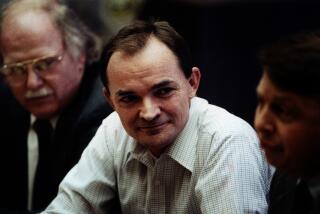Killer ‘Worth Preserving,’ She Says : Friend of Kraft Urges Jury to Spare His Life
- Share via
A longtime friend urged jurors Wednesday to spare the life of Randy Steven Kraft, saying the convicted serial killer is “a thinking human being, and that’s something worth preserving.”
Jurors at Kraft’s Santa Ana trial, who convicted the 44-year-old computer consultant of first-degree murder in June for the deaths of 16 young men in Orange County, heard more evidence about whether Kraft should be executed or sentenced to life in prison without parole.
As on Tuesday, the opening day of evidence in the penalty phase hearing, Kraft questioned each defense witness himself.
“Hi Miriam, it’s been a long time,” Kraft said to Miriam Phillips, who, along with her husband, became close to Kraft.
Phillips told the jurors she felt guilt because she did not visit him at the Orange County Jail after his arrest in 1983. Kraft, she said, had been the most understanding among her friends when she suffered anxiety over her pregnancy.
“I felt I should have been a friend to him, because he had been a friend to me when I needed him,” she said.
Defense testimony has shown Kraft maintained a wide network of friends in both the gay and heterosexual worlds and remains close to his family. Two nieces testified for Kraft on Wednesday, one of them describing his thoughtfulness in remembering birthdays and special occasions.
Details about Kraft’s life in his quiet Long Beach neighborhood have been revealed in court for the first time. He was a vegetarian, loved to grow tomatoes and play the piano.
The prosecutor, Deputy Dist. Atty. Bryan F. Brown, who has asked few questions during the defense case, reminded jurors about Kraft’s other life style when he asked Phillips if she had heard about any of the evidence linking Kraft to the murders. Phillips acknowledged that she had.
Kraft was arrested May 14, 1983, when two California Highway Patrol officers stopped him for a traffic violation and found a dead Marine in the front passenger seat of his car. Kraft was quickly linked to dozens of other murders of young men in the Southland, most between the ages of 18 and 25, and several were Marines. Most of the victims had been sexually mutilated or abused, their bodies dumped along freeways or in remote areas.
Defense attorney C. Thomas McDonald has asked each of the witnesses whether they saw any sign that Kraft could have committed such horrible crimes. None at all, they all said.
Kraft’s barber, James Dooley, also a close friend, described him as a “low-key kind of person, not aggressive at all.” Phillips called Kraft “very sensitive, very easygoing.” One friend from grade school, who had been in Cub Scouts with Kraft, described him as the most intelligent person in their age group.
Witnesses testified, at Kraft’s urging, that he was not especially attracted to younger men and did not have any special interest in Marines.
Some of his questions puzzled court observers, and others clearly backfired. When asked, one niece said she was unaware Kraft was the family peacemaker, and another witness said he considered Kraft to be militaristic in college, contradicting another suggestion by Kraft.
More to Read
Sign up for Essential California
The most important California stories and recommendations in your inbox every morning.
You may occasionally receive promotional content from the Los Angeles Times.












